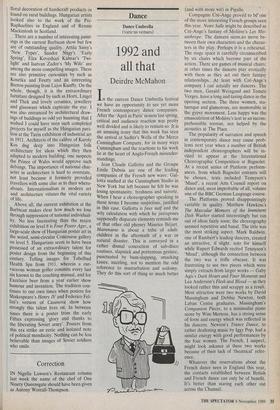Dance
Dance Umbrella (varieus venues)
1992 and all that
Deirdre McMahon
In the current Dance Umbrella festival we have an opportunity to see yet more French contemporary dance companies. After the `April in Paris' season last spring, critical and audience reaction was pretty well divided and is likely to remain so. It is an amusing irony that this week has seen the arrival at Sadler's Wells of the Merce Cunningham Company, for in many ways Cunningham and the reactions to his work lie at the heart of Anglo-French misunder- standings.
Jean Claude Gallotta and the Groupe Emile Dubois are one of the leading companies of the French new wave. Gal- lotta studied at the Cunningham Studio in New York but left because he felt he was losing spontaneity, freshness and naiveté. When I hear a choreographer speaking in these terms I become suspicious, justified in this case. Gallotta is faux naif and the wily calculation with which he juxtaposes supposedly disparate elements reminds me of that other old phoney Maurice Bejart. Mammame is about a tribe of adult- children in the aftermath of a war or natural disaster. This is conveyed in a rather dismal concoction of sub-disco routines, slapstick and portentous gesture, punctuated by bum-slapping, smacking kisses, nuzzling, not to mention the odd reference to masturbation and sodomy. They do this sort of thing so much better (and with more wit) in Pigalle.
Compagnie Cre-Ange proved to be one of the more interesting French groups seen this year. Noire Salle might be described as Cre-Ange's fantasy of Moliere's Les Mis- anthrope. The dancers seem .to move be- tween their own characters and the charac- ters in the play. Perhaps it is a rehearsal. The stage space is carefully circumscribed by six chairs which become part of the action. There are games of musical chairs; at other times the dancers play erotically with them as they act out their fantasy relationships. At least with Cre-Ange's company I can actually see dancers. The two men, Gerald Weingand and Tomer) Verges, have a long and taxing dance in the opening section. The three women, sta- tuesque and glamorous, are memorable in the gypsy movement. Less happy was the emasculation of Moliere's text in an incom- prehensible torrent, not helped by the acoustics at The Place.
The popularity of narration and speech in contemporary dance may cause prob- lems next year when a number of British independent choreographers will be in- vited to appear at the International Choreographic Competition at Bagnolet. At a recent series of Platform perform- ances, from which Bagnolet entrants will be chosen, texts included Tennyson's `Maud', a recent Arts Council report on dance and, most improbable of all, volume one of the BBC German Language course.
The Platforms proved disappointingly variable in quality. Matthew Hawkins's The Muscular Memory of the Imminent Dish Washer started interestingly but ran out of ideas fairly soon; the choreography seemed repetitive and banal. The title was the most striking aspect. Mark Baldwin, one of Rambert's leading dancers, created an attractive, if slight, solo for himself while Rupert Edwards recited Tennyson's `Maud', although the connection between the two was a trifle obscure. It was frustrating to see two pieces which were simply extracts from larger works — Gaby Agis's Dark Hours and Finer Moments and Lea Anderson's Flesh and Blood — as they looked rather thin and scrappy as a result. Most attractive were two works by David Massingham and Debbie Newton, both Laban Centre graduates. Massingham's Companion Pieces, to a minimalist piano score by Wim Mertens, has a strong sense of form and energy which was reflected in his dancers. Newton's Trance Dance, to rather deafening music by Iggy Pop, had a similar energy with good performances by the four women. The French, I suspect, might look askance at these two works because of their lack of 'theatrical' refer- ence.
Whatever the reservations about the French dance seen in England this year, the contacts established between British and French dance can only be of benefit. It's better than staring each other out across the Channel.
















































 Previous page
Previous page